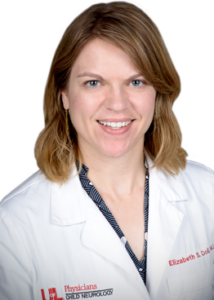

Elizabeth S. Doll, MD, completed years of medical training to become a child neurologist, including earning her medical degree from the University of Louisville School of Medicine in 2011. But what most people don’t know is she also spent hundreds of hours at Harvard University, training in the art of acupuncture.
“I’ve always been interested in integrative and alternative medicines,” said Doll, who cares for patients at University of Louisville Physicians – Child Neurology and Norton Children’s Hospital. “Even with all the advancements in modern medicine, we still can learn a lot from ancient treatments.”
She’s recently combined her love of neurology and acupuncture. She offers acupuncture as a way to help with migraines and severe headaches in teens and children as young as 6 years old.
“Research shows that acupuncture, when done properly, is a great, noninvasive way to treat headaches and other pain conditions, often without the use of medicines,” Doll said. “Many patients I treat see relief quickly.”
Doll said when most people think of acupuncture, they picture someone lying down with hundreds of needles all over their body. That’s not the treatment she provides.
“My treatments are about 45 minutes and involve roughly 10 to 15 needles,” she said. “Those needles are usually placed at acupuncture points in distant areas, like the ears and feet.”
How can needles treat headaches?
“It’s about opening up pathways throughout the body,” Doll said. “You’d be amazed to see how different body parts are connected.”
She admits that most patients and families are skeptical or fearful at first, but once they try it, they become believers.
“People have a fear of needles, but it really doesn’t hurt,” Doll said. “And patients end up liking it when they feel the results.”
Doll said acupuncture isn’t going to replace modern treatments and medications, but rather it’s a good way to supplement care, especially in the hospital setting.
“It’s not a miracle cure,” she said. “Acupuncture can relieve pain quickly, but medicines and other forms of treatment are still important. Acupuncture can be effective long-term, but periodic treatments outside the hospital setting are needed.”
For those with severe headaches, acupuncture can make a big difference.
“I recently had a patient in the hospital and we were treating her with IV medication for her migraine,” Doll said. “After performing acupuncture, she didn’t need any more medications and went home the next day.”
Reprinted by permission from Norton Children’s Hospital.






























